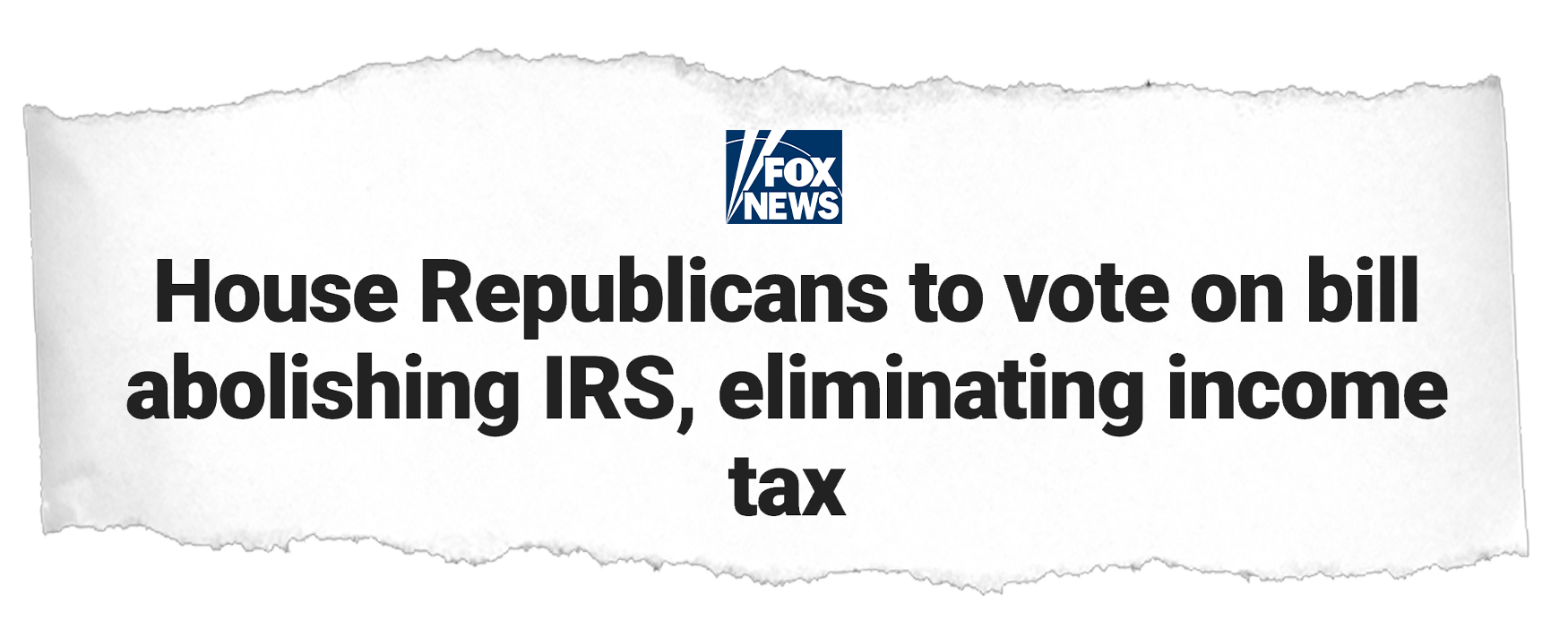|
John,
In their first legislative vote of the new Congress, House Republicans voted to defund the IRS so their wealthy and corporate donors can continue dodging taxes. Next, they said that they would block increasing the U.S. debt limit unless major cuts were made to critical services benefiting working families, including Social Security and Medicare.[1]
Now, we’ve learned that House Republicans are planning a vote on a new bill to abolish the IRS, abolish the entire federal tax code, and create a national sales tax of at least 30%―increasing the cost of everything you buy from groceries to clothing and beyond.[2]
This drastic change would land squarely on the backs of working- and low-income households while cutting taxes of the richest 1%.
Pitch in today to fight back against the Republican plan to slash taxes on the wealthy while raising taxes on everyone else.
Republicans claim to care about inflation, but it would take a national sales tax of between 30 – 60% on all goods and services to make up for abolishing federal income, payroll, estate, and gift taxes. This would dramatically increase out-of-pocket expenses for all Americans.
Thank you for fighting back against Republican attempts to slash taxes on the wealthy and shift taxes to everyone else.
Sarah Christopherson
Legislative and Policy Director
Americans for Tax Fairness Action Fund
[1] “Speaker Drama Raises New Fears on Debt Limit,” The New York Times, Jan. 7, 2023
[2] “’Fair Tax’ Plan Would Abolish the IRS and Shift Federal Taxes from the Wealthy to the Rest of Us,” Institute on Taxation and Economic Policy, Jan. 11, 2023
-- Frank's email --
John,
There’s no denying it. Extremists have taken over the House Republican conference.
We’ve learned that among other concessions Kevin McCarthy made in exchange for the Speaker’s gavel, he’s agreed to hold a vote on a bill that would abolish the IRS and abolish the entire federal tax code, from
income taxes to the payroll taxes that fund Social Security and Medicare, to estate and gift taxes only paid by the very wealthy
.[1]

How will the federal government afford anything―from natural disaster responses to healthcare to nutrition assistance―with none of these taxes? The answer is, a new national sales tax of at least 30%, which would require everyone, no matter how poor or rich, to pay the same tax rate. However, according to the Institute on Taxation and Economic Policy (ITEP), it would require a national sales tax of at least 60% to make up for the lost revenue.[2]
Furthermore, this GOP-tax on everything we buy—groceries, cars, homes, healthcare―would disproportionately impact middle-class and low-income people and families. Another ITEP study shows that the top 1% pays just a 0.9% average share of their income in state sales taxes compared to a 7.1% share for the lowest-income households.[3] So, this new Republican bill would shift who pays taxes by A LOT.
Donate today to fight back against House Republican plans to abolish taxes on the wealthy while making middle- and working-class households shoulder the cost of virtually all federal programs.
Republicans profess to be the party of fiscal responsibility, but according to their legislative agenda they’re really the party that puts the wants of their wealthy and corporate donors ahead of the needs of the American people.
Help fight back against the House Republican agenda that seeks to slash taxes paid by the wealthy and increase taxes paid by working- and low-income families. Donate today!
If you've saved your payment information with ActBlue Express, your secure donation will go through immediately:
Together, we’re fighting back against policies devised by anti-tax extremists and fighting for policies that lower costs for working families.
Frank Clemente
Executive Director
Americans for Tax Fairness Action Fund
[1] House Republicans to vote on bill abolishing IRS, eliminating income tax, Fox News, Jan. 10, 2023
[2] “’Fair Tax’ Plan Would Abolish the IRS and Shift Federal Taxes from the Wealthy to the Rest of Us,” Institute on Taxation and Economic Policy, Jan. 11, 2023
[3] “Who Pays? 6th Edition,” Institute on Taxation and Economic Policy
|